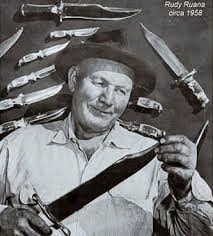Having
left the decimated family farm in North Dakota and looking for greener
pastures, 1938 found Rudy Ruana in the small community of Bonner, Montana
working as a mechanic and welder at a small garage. In order to help his family
survive during the post depression era, Ruana began to make a few knives on the
side.
A skill
that originated in the 1920’s when he was a farrier in the cavalry, making his
first knives for a couple of Native Americans in need of a better tool for
skinning horses. As time passed and the reputation of Ruana’s knives grew,
demand became so great that Rudy began making knives full time in 1952, calling
his business Ruana Knife Works. In 1964 Ruana’s son-in-law, Vic Hangas left a
job with the phone company and put his artistic talents to work, joining Ruana
in the business. Hangas’ son Mark began working at the company in 1976. At the
end of 1983 Ruana retired at the age of 80 and sold the business to the Hangas
family. In 1984 Mike Hangas joined his brother and Dad and the business was
incorporated. Rudy Ruana passed away in April of 1986.
He
received the honor of being posthumously inducted into the American Blade Smith
Society Hall of Fame in 1997 and BLADE Magazine’s Cutlery Hall of Fame in 2002.
As of 2011, Vic, Mark and Mike Hangas have combined Ruana Knife making
experience in excess of 100 years.
In an
era of outsourcing and diminishing Made in America products, Ruana Knives are
still handcrafted in the small shop where Rudy Ruana began forging out blades
over 70 years ago. While a few things have changed over the years, they are
still using the same methods and much of the same equipment Rudy used. Their
goal is to give our best effort on a daily basis while maintaining Rudy Ruana’s
work ethic and emphasis on uncompromising quality over quantity, proudly
crafting knives that are American Made as much as a product possibly could be. We
will continue our commitment to creating knives that are first and foremost
usable and durable, and as evidenced by customer demand, increasingly
collectible. When we’re not at the shop working, they can often be found
field-testing knives in Montana’s great outdoors.




